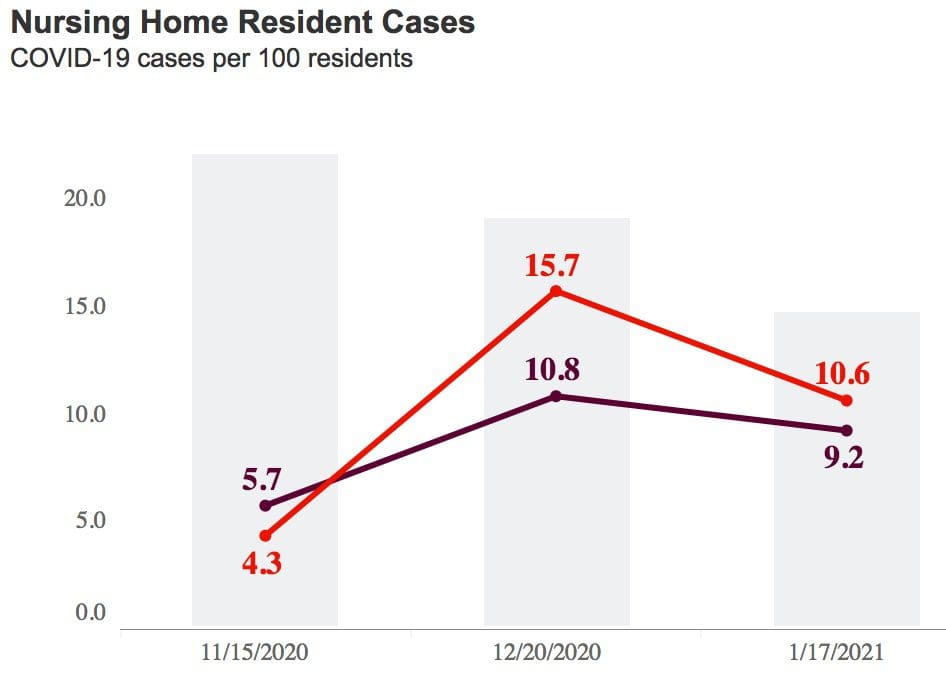Search Posts
Recent Posts
- In the News… recap of the week ending May 3, 2025 May 3, 2025
- Rhode Island Weather for May 3, 2025 – Jack Donnelly May 3, 2025
- Out and About in RI: 14th annual Alzheimer’s conference. Caregiving and research. May 3, 2025
- Real Estate in RI: Architectural ranch in Westerly, $1,265,000 with Residential Properties for seller May 3, 2025
- Burn with Kearns: Compete longer, injury-free, perform like a fighter, at any age – Kevin Kearns May 3, 2025
Categories
Subscribe!
Thanks for subscribing! Please check your email for further instructions.

New: AARP Shows RI Facilities Remain Hotbed for COVID-19 – Herb Weiss
By Herb Weiss, contributing writer on aging issues
As the Rhode Island Health Department (RIDOH) announces that cases of COVID-19 are declining and is loosening up restrictions on the reopening of bars and our social gatherings, AARP Rhode Island warns that the state’s nursing homes remain a hotbed for COVID-19 infections, and the “death rate remains disturbing.”
Rhode Island’s largest aging advocacy group calls on the General Assembly to take action this session to enact legislation to protect facility staff and residents.
Since the beginning of the pandemic, more than 162,000 residents and staff in nursing homes and other long-term care facilities have died nationwide, and nearly 1.3 million people are known to have been infected with coronavirus in these facilities. Rhode Island has recorded 1,430 deaths in skilled nursing facilities, nursing homes, assisted living facilities and other eldercare facilities.
On Feb. 11, AARP Rhode Island released its Nursing Home COVID-19 Dashboard, the data revealing that the COVID-19 pandemic crisis in these facilities still continues despite incremental improvements in all four dashboard categories.

The dashboard analyzes federally reported data in four-week periods going back to June 1, 2020. Using this data, the AARP Public Policy Institute, in collaboration with the Scripps Gerontology Center at Miami University in Ohio, created the dashboard to provide snapshots of the virus’ infiltration into nursing homes and impact on nursing home residents and staff, with the goal of identifying specific areas of concern at the national and state levels in a timely manner.
Taking a Snapshot
According to the data (Dec. 21 to Jan. 17) from AARP Rhode Island’s latest Nursing Home COVID-19 Dashboard, the rate of new coronavirus cases per 100 residents declined from 15.7 to 10.6 among residents and from 12.5 to 10.6 among staff. While cases are lower than in the previous time period, resident cases remain the second highest in New England in AARP’s dashboard analysis, with nearly four times the cases in Rhode Island nursing homes reported in October and November.
Meanwhile, the latest dashboard data indicated that resident death rates dropped from 2.60 to 1.82 for every 100 people living in a nursing home and that nursing home staff cases dropped from 12.5 per 100 workers to 10.6.
The dashboard also reveals that PPE shortages dropped sharply. Shortages of personal protective equipment (PPE) have declined from 20.3 percent of nursing homes without a one-week supply to 4.3 percent– the lowest number since the first dashboard report in June, 2020. Staff shortages were relatively steady, dropping from 41.9 percent of facilities reporting shortages to 40 precent.
AARP Rhode Island calls on Governor Gina Raimondo and Lt. Governor Dan McKee to protect nursing home residents and staff from COVID-19. “We are approaching the one-year anniversary of the first known coronavirus cases in nursing homes, yet they remain appallingly high, said AARP Rhode Island State Director Kathleen Connell in a statement announcing the release of the latest dash data said, “The devastation this pandemic has brought to nursing home residents and their families has exposed fundamental reforms that must be made in nursing homes and to the long-term care system. We cannot lower our guard, she says.
AARP Rhode Island’s COVID-19 Legislative Agenda
Connell called for Rhode Island lawmakers to act immediately, focusing this year on:
The Rhode Island nursing home industry has struggled with quality care and infection control for years. Connell called for Rhode Island lawmakers to act immediately, focusing this year on:
1. Enacting or making permanent the components of AARP’s five-point plan:
- Prioritizing regular and ongoing testing and adequate personal protective equipment (PPE) for residents and staff—as well as for inspectors and any visitors.
- Improving transparency focused on daily, public reporting of cases and deaths in facilities; communication with families about discharges and transfers; and accountability for state and federal funding that goes to facilities.
- Ensuring access to in-person visitation following federal and state guidelines for safety, and require continued access to virtual visitation for all residents.
- Ensuring quality care for residents through adequate staffing, oversight, and access to in-person formal advocates, called long-term care Ombudsmen.
2. Reject immunity and hold long-term care facilities accountable when they fail to provide adequate care to residents.
3. Establishing minimum nursing staffing standards.
4. Ensuring that increases in nursing homes’ reimbursement rates are spent on staff pay and to improve protections for residents.
5. Ensuring progress is made so that in-person visitation can safely occur and facilitating virtual visitation.
“Additionally, our leaders must reject policies that take away the rights of residents to hold nursing homes accountable when they fail to provide adequate care, Connell added. “Now is not the time to let nursing homes off the hook for abuse, neglect, and even death.”
AARP Rhode Island’s letter to Gov. Gina Raimondo, urging her to withdraw her nursing home immunity Executive Order. (There has been no reply)
As the first year of the COVID-19 pandemic approaches, RIDOH notes that 64 percent of all deaths have women and men in Rhode Island’s nursing homes and assisted living facilities. In the past 13 days, 116 new cases in these facilities have been diagnosed – with 41 new deaths. At weekly updates from Dr. Nicole Alexander-Scott, it used to be that the death statistics were broken down by age, noting how many were lost “in their 60s, in their 70s”, etc. but notably this no longer is reason for pause and expression on condolence.
Unless Rhode Island lawmakers act quickly, older Rhode Islanders in these facilities will continue to be at a very high-risk of catching COVID-19 and the fatality death rate will remain disproportionately high for seniors. As residents receive their vaccine shots, first and second, we in turn hope that the refusal rate of staff to the vaccination is going down.
It’s time to act.
The full Nursing Home COVID-19 Dashboard is available at www.aarp.org/nursinghomedashboard.
For more information on how COVID is impacting nursing homes and AARP’s advocacy on this issue, visit www.aarp.org/nursinghomes.
Herb Weiss, LRI’12, is a Pawtucket writer covering aging, health care and medical issues. To purchase Taking Charge: Collected Stories on Aging Boldly, a collection of 79 of his weekly commentaries, go to herbweiss.com.
_____

Herb Weiss has enjoyed a distinguished 41 year career in journalism, earning a national reputation as an expert on aging, health care and medical issues. Over 780 articles that he has authored or coauthored have appeared in national, state and local publications. Governor Gina Raimondo appointed Him to the Rhode Island Advisory Commission on aging. Today, Herb’s weekly newspaper column appears in the Pawtucket Times and Woonsocket call, two North Rhode Island daily newspapers, and will now run in RINewsToday.com. Herb and his wife, Patty Zacks, reside in Pawtucket, Rhode Island.
